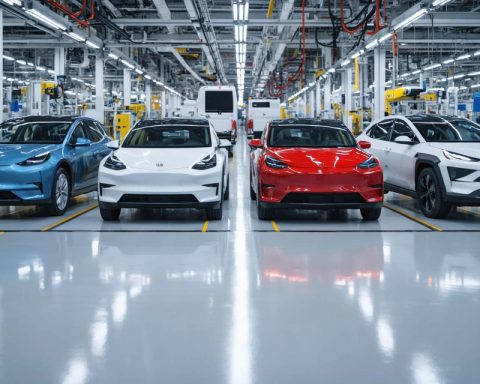- India abolishes import duties on crucial inputs for EV and mobile phone batteries, boosting domestic manufacturing.
- The Finance Bill slashes duties on 35 EV battery goods and 28 mobile phone battery components, enhancing global competitiveness.
- The six percent digital tax on online advertisements is abolished, lowering costs and strengthening market resilience.
- Tax relief measures, including “marginal relief,” aim to ease fiscal burdens on citizens and ensure no tax liability for incomes up to ₹12.75 lakh.
- Parity in pensions for central government employees reflects a commitment to citizen welfare.
- A ‘nudge’ campaign encourages voluntary disclosure of foreign income and assets to widen the tax base strategically.
- The Finance Bill symbolizes India’s ambition for inclusive and expansive economic reform and competitiveness.
India’s capital buzzed with anticipation as Finance Minister Nirmala Sitharaman unveiled a landmark stride in the country’s industrial narrative. Against the backdrop of persistent global economic challenges, the new Finance Bill introduces a daring move: the abolishment of import duties on specific inputs vital for Electric Vehicle (EV) and mobile phone battery production. This policy shift, aiming to galvanize India’s domestic manufacturing prowess, is poised to redefine the country’s competitive edge on the global stage.
With sweeping gestures of innovation, the Finance Ministry has set the stage for a manufacturing renaissance. By slashing duties on 35 crucial capital goods for EV batteries and 28 essential components for mobile phone batteries, the government aspires to not only boost domestic production but also enhance export competitiveness. The strategy is straightforward yet potent—make Indian products more economically viable and world-class, while simultaneously nurturing the domestic industry.
The legislative debate in the Lok Sabha, marked by the passage of the Finance Bill, was animated by amendments including the abolishment of a much-debated six percent digital tax on online advertisements. This rationalization of customs tariffs resonates as a beacon for industries, promising lower costs and greater market resilience. Importers and exporters alike will find renewed encouragement as the tariff structure finds harmony, aligning with broader efforts to facilitate trade and economic growth.
Symbolically, the legislation arrives ahead of a consequential U.S. delegation’s visit, where the discourse of reciprocal tariffs with keen economic implications looms. Yet, the minister underscored the continuity of India’s custom rationalization, sensitive to the evolving global trade winds.
In parallel, the Finance Bill hints at a transformative potential on the domestic front. The sprawling tax relief measures delineated, particularly the nuanced “marginal relief” for incomes brushing the tax-free threshold, underscore a government keen on easing the fiscal burdens on its citizens. A standard deduction ensures that salaried individuals with incomes up to ₹12.75 lakh face no tax liability, fostering a landscape of economic inclusivity.
Adding another feather to its legislative cap, the government announced measures ensuring parity in pensions for all strata of central government employees. This decision, tracing back to the proposals of the sixth pay commission, depicts a government mindful of its citizenry’s holistic well-being.
Beyond fiscal policies, the government launched a ‘nudge’ campaign elegantly urging citizens to declare foreign income and assets. This campaign epitomizes a soft yet strategic approach to broaden the tax base without coercion.
The Finance Bill, 2025 stands as a testament to India’s ambition. It seeks to not just reform old structures but to manifest an economic vision that is both inclusive and expansive. The future of India’s place in the global economic order seems more assured, thanks to these pivotal reforms that echo a commitment to excellence, competitiveness, and a burgeoning domestic market that can thrive in an interconnected world.
How India’s Finance Bill is Revolutionizing EV and Mobile Manufacturing: A Comprehensive Deep Dive
Introduction
India’s latest Finance Bill, unveiled by Finance Minister Nirmala Sitharaman, represents a monumental shift in the country’s industrial trajectory. With the global economy grappling with persistent challenges, this strategic legislation introduces key reforms, notably the removal of import duties on specific inputs essential for Electric Vehicle (EV) and mobile phone battery production. This move is set to invigorate India’s domestic manufacturing landscape and solidify its competitive stance on the international platform.
Key Facts Fully Explored
1. Impact on the EV Industry:
– India is poised to become a global hub for Electric Vehicles. By removing import duties on 35 crucial components used in EV battery production, the legislation aims to reduce production costs significantly, making Indian-made EVs more affordable and competitive in the global market.
– The domestic production of EV batteries is expected to surge, attracting investments in local manufacturing sectors.
2. Transformation in Mobile Manufacturing:
– Similar reforms for mobile phone battery components (28 items) mirror the strategy for EVs. Lower costs in battery production will likely lead to more locally manufactured mobile phones, potentially boosting exports.
3. Economic Inclusivity and Tax Relief:
– The Finance Bill introduces a standard deduction for salaried individuals, ensuring those earning up to ₹12.75 lakh are exempt from tax. This measure is likely to increase disposable incomes, driving consumer spending and stimulating domestic demand.
4. Parity in Pension Schemes:
– The government has ensured pension parity for central government employees, a move that demonstrates a commitment to social equity and employee welfare.
5. Broader Tax Base Initiatives:
– A strategic ‘nudge’ campaign encourages voluntary reporting of foreign income and assets, aiming to expand the tax base without implementing coercive measures.
Trends and Market Forecasts
– Rise in Domestic Investments:
The removal of import duties is expected to attract both domestic and international investments in the EV and mobile manufacturing sectors, fostering innovation and technological advancement.
– Competitive Export Market:
With reduced production costs, India could emerge as a significant exporter of EVs and mobile phones, gaining a foothold in previously inaccessible markets.
Controversies & Limitations
– While the reforms propose substantial economic benefits, there are concerns about the potential strain on domestic raw material suppliers facing new competition from imported goods.
– Critics argue that these reforms might benefit large manufacturers disproportionately, leaving small and medium enterprises (SMEs) struggling to compete.
Real-World Use Cases
– Enhanced Manufacturing Ecosystem:
Companies like Tata Motors and Mahindra in the EV sector, and giants like Samsung and Xiaomi in mobile manufacturing, stand to gain, potentially boosting their production and global market share.
Actionable Recommendations
1. For Manufacturers:
– Leverage the reduction in import duties to optimize cost structures and enhance profitability.
– Explore collaborative partnerships to strengthen supply chain resilience.
2. For Investors:
– Consider investing in Indian manufacturing industries poised for growth due to these fiscal reforms.
– Evaluate emerging startups in the EV and mobile technology sectors, which may offer innovative solutions fostering industry growth.
Conclusion
India’s Finance Bill is not just a set of tax reforms; it’s a visionary approach designed to propel the nation’s industrial capacity and global economic relevance. By focusing on competitive manufacturing and fostering economic inclusivity, India is positioning itself not just as a participant but as a leader in the global economic arena.
For further updates on India’s dynamic financial landscape, visit Press Information Bureau.














